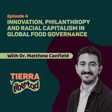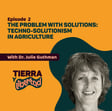
Episode 1: Migrant workers and structural racism in agriculture, with Dr. Seth Holmes
In this episode, anthropologist and medical physician Dr. Seth Holmes from the University of California, Berkeley, and the University of Barcelona shares his two decades of experience studying the role and importance of agricultural farm workers in our current food system. He discusses the structural racism they face and the health issues they endure to put food on our tables.
Having lived alongside Triqui Mexican farm workers during his research—from the mountains of Oaxaca to the illegal crossing of the US border through the desert, to harvesting berries with them in Washington State and California—Dr. Holmes presents a unique perspective on the injustices faced by these essential workers.
👋 Let's connect!
✊Support us: https://fr.tipeee.com/tierra-y-libertad-podcast
📝 Show notes:
Fresh Fruit, Broken Bodies (Book): www.ucpress.edu/book/978052039863…uit-broken-bodies
First Time Home (Movie): www.firsttimehomefilm.com/
Binational Center for the Development of Oaxacan Indigenous Communities: immigrantinfo.org/resources/binati…ous-communities/
Coalition of Immokalee Workers: ciw-online.org/
United Farm Workers: ufw.org/
Familias Unidas por la Justicia: familiasunidasjusticia.com/
Jornaleras en Lucha: jornalerasenlucha.org/
Codetras: www.codetras.org/
Fair Food Program: fairfoodprogram.org/



